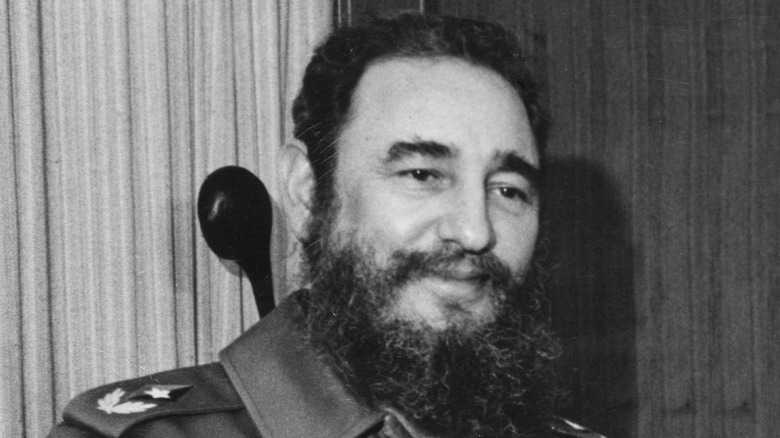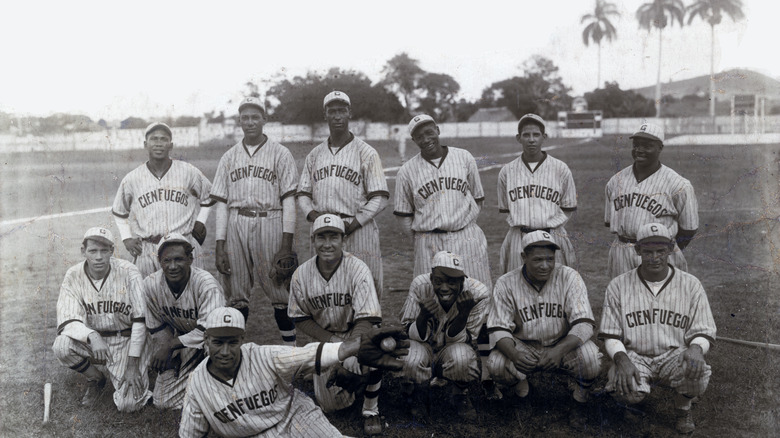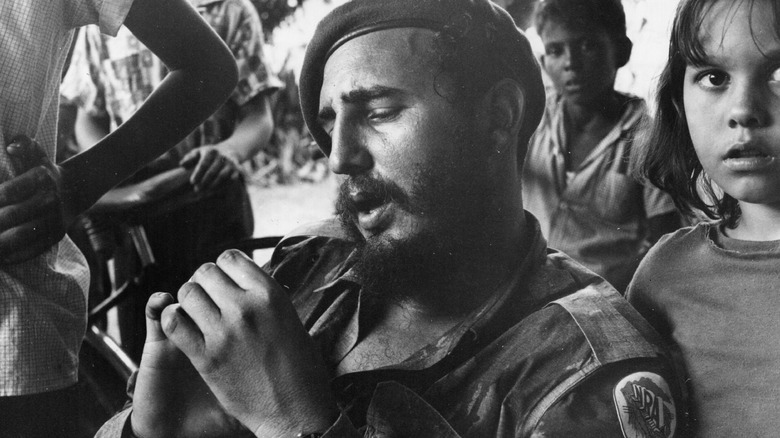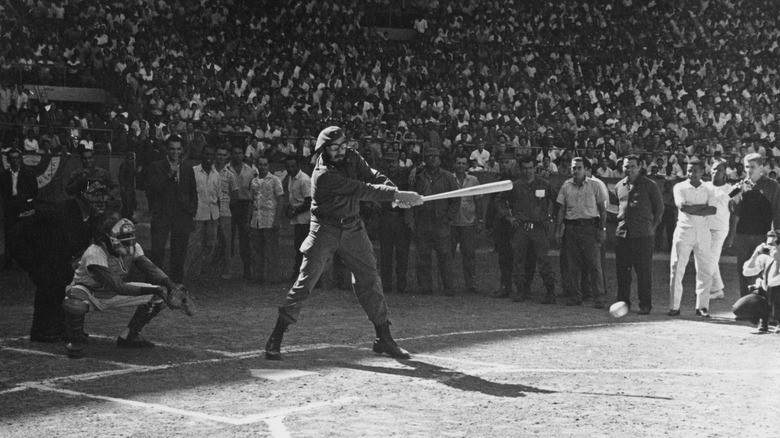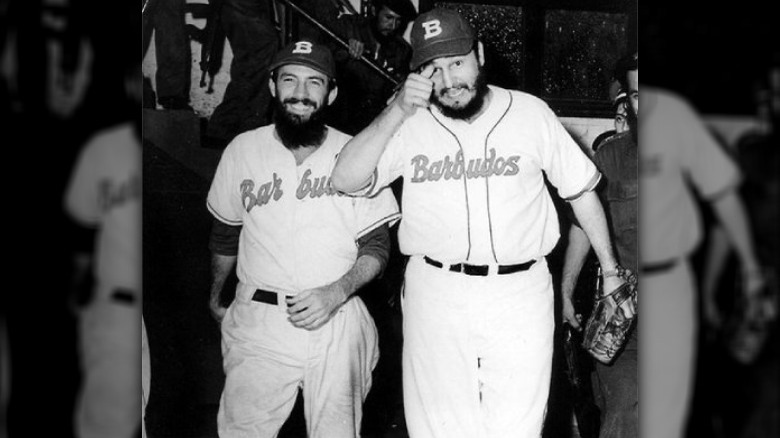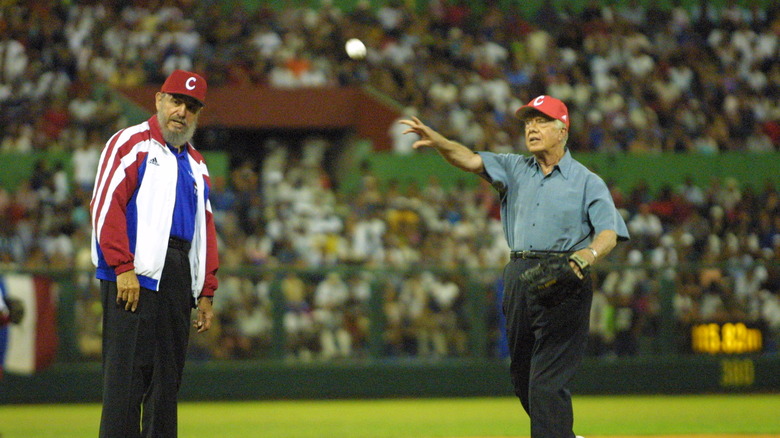The Myth You Need To Stop Believing About Fidel Castro And Baseball
While baseball may be known as America's pastime, it has flourished in other parts of the world. Japan is home to high levels of play and produced players like Ichiro Suzuki, Shohei Ohtani, and Sadaharu Oh — the man with the most home runs ever hit, per Britannica. In the Caribbean, the sport is massively popular in places like Puerto Rico and the Dominican Republic, which make produce 2.44 percent and 10.26 pecent of Major Leaguers respectively on Opening Day Rosters in 2021 (via Baseball America). Another Caribbean nation with an interesting tie to the game is Cuba.
A laundry list of baseball players hail from Cuba, according to Baseball Reference. Jose Canseco, Aroldis Chapman, and Yasiel Puig were born in the island nation, which is about 90 miles off the United States at its closest point. However, a surprising myth related to both Cuban history and baseball has practically become an urban legend. Did Cuban dictator Fidel Castro nearly have a major league career in the United States? And did his failure to reach the big leagues directly lead to his role in leading the Cuban Revolution?
Baseball in Cuba
Baseball in Cuba goes back about as far as it does in the United States. According to Cuba Culture, the sport debuted in the country in the 1860s when it was brought to the island by immigrants, traders, and sailors. Another group that helped spread the game were Cuban college students attending schools in the United States, like Nemesio and Ernesto Guilló. The two attended school in Alabama and returned to Cuba in 1864 with knowledge of the game that led them to establish the Havana Base Ball Club in 1868, per Baseball de Cuba.
Baseball quickly supplanted the most popular sport in Cuba — bullfighting — though not everyone was on board with the game. The same year the Guilló brothers formed their baseball team, the first Cuban War of Independence was underway. Cuba was then ruled by Spain, and the government banned baseball, because the sport was perceived as "an anti-Spanish game with insurrection tendencies, opposed to the language and favored the lack of affection to Spain..."
That ban fell by the wayside once Cuba gained independence, and by the 1930s and 1940s, the New York Giants and Brooklyn Dodgers held spring training in Cuba for a few years, according to the MLB. From 1954 to 1960 a Triple-A affiliate of the Cincinnati Reds known as the Havana Sugar Kings were based in Cuba and played games as members of the United States minor league system, per Ebbets Field.
Fidel Castro's early years
Fidel Castro was born in 1926, in the southeastern part of Cuba. Castro's father, Ángel Castro y Argiz, was a Spanish immigrant and successful sugar cane farmer. He engaged in an extramarital affair with one of his servants who he went on to marry. That marriage yielded seven children including Fidel Castro and his brother Raul, per Britannica.
Part of the reason that the story surrounding Castro's alleged brush with Major League Baseball has become so prevalent is that he was a good athlete. He played several sports while attending a Catholic school in Havana where he played baseball, basketball, table tennis, and was a high jumper on the track and field team. Castro was even named Havana's outstanding schoolboy sportsman during the 1943-1944 school year. According to The New York Times, it's thought that Castro's primary sport was actually basketball, given his tall stature at around 6 feet 2 inches or 6 feet 3 inches.
Castro became invested in politics when he began attending the University of Havana in 1945. He went on to participate in several political movements in other countries, including an attempt to invade the Dominican Republic. Castro also took part in a series of riots that occurred in Bogota, Colombia, in 1948.
The myth of Castro's baseball career
The widespread myth about Fidel Castro and his baseball career was that he had a tryout with a major league club in the United States. Different versions of the story feature different teams that the future dictator tried out for, but the New York Yankees and the Washington Senators are frequently part of these stories, according to Baseball Reference, while other sources mention the Pittsburgh Pirates and New York Giants.
While the teams involved differ, the story is usually that a professional scout unknowingly held the power to change the course of history by signing the soon-to-be dictator. According to Yahoo Sports, other versions of the story say that Castro received a tryout with a major league team, but he didn't make the cut which this version claims is the reason for his anti-American views. Other versions claim that Castro was offered a contract and turned it down to pursue politics.
None of these are true. Castro was a pitcher, but according to SABR, he didn't get anywhere near the major leagues, dispute the countless tales that suggest otherwise. It's thought that the true apex of his pitching came in college when he took to the hill to fire fastballs during intramural games, as he wasn't able to crack the varsity roster at the University of Havana.
Castro and the Sugar Kings
While his playing may not have picked up much steam, Castro really was a big baseball fan. According to NBC Sports, he was known to frequent Havana Sugar Kings games. He also organized pick-up games and had his own team called Los Babudos, which means The Bearded Ones. In 1959, Los Babudos even played an exhibition game against a team of military policemen before a Sugar Kings game against the Rochester Red Wings. The day after the exhibition served as the opening act for the Sugar Kings and Red Wings, the two teams played again, only the game went long and didn't end until after midnight. That meant that the game ran into July 26, 1959.
Castro's 1953 political revolution, known as the 26th of July Movement, marked the day he and his supporters launched an attack on an army barracks that set the wheels in motion for the Cuban Revolution. It was cause for celebration, and when the clock struck midnight the crowd went wild — so wild, that some fans began firing guns in celebration. This wound up injuring Rochester Red Wings shortstop Leo Cárdenas and the team's third-base coach Frank Verdi, per SABR.
Castro had taken power in 1959, according to Britannica, which means that the Sugar Kings were still operating after the Cuban Revolution and playing teams from the United States mainland. Given the state of politics in Cuba, this wasn't sustainable. The team made a go of it in 1960, but as U.S.-Cuba relations started to deteriorate, they fled the country mid-season and finished out the year in Jersey City, New Jersey.
Castro used sports as a political tool
Castro used sports as a way of trying to assert Cuban dominance, a tactic used by one of his regime's allies, the Soviet Union — particularly in ice hockey rinks. According to The New York Times, there was a notable difference in Castro's approach. Instead of focusing on building elite teams to compete on the international stage, he instead promoted sports to the entire population. It's estimated that 95 percent of Cubans take part in some kind of organized sport or exercise activity.
"I think Fidel Castro legitimately liked sports," Dave Wallechinsky, president of the International Society of Olympic Historians told the New York Times in 2016. "One got the sense with East Germany, for example, that it really was a question of propaganda and that government officials didn't have that obsession with sport itself that Fidel Castro did."
Castro felt that sports could serve as effective military training. According to Mashable, the Cuban dictator believed that basketball in particular required many of the same skills and attributes required to be successful in guerilla warfare. Castro himself continued playing until he was nearly 56 years old, but stopped after breaking his toe in a 1982 exhibition game.
